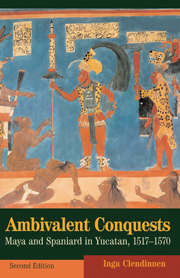Book contents
- Frontmatter
- Contents
- List of illustrations
- Preface to the second edition
- Preface to the first edition
- Acknowledgments
- Map I Yucatan in the conquest period
- Part I Spaniards
- 1 Explorers
- 2 Conquerors
- 3 Settlers
- 4 Missionaries
- 5 Conflict
- 6 Crisis
- 7 Attrition
- 8 Retrospections
- Epilogue: The hall of mirrors
- Part II Indians
- Epilogue: Confusion of tongues
- Appendix: A sampler of documents
- Glossary of Spanish and Maya terms
- Notes
- Select bibliography
- Index
5 - Conflict
Published online by Cambridge University Press: 05 October 2013
- Frontmatter
- Contents
- List of illustrations
- Preface to the second edition
- Preface to the first edition
- Acknowledgments
- Map I Yucatan in the conquest period
- Part I Spaniards
- 1 Explorers
- 2 Conquerors
- 3 Settlers
- 4 Missionaries
- 5 Conflict
- 6 Crisis
- 7 Attrition
- 8 Retrospections
- Epilogue: The hall of mirrors
- Part II Indians
- Epilogue: Confusion of tongues
- Appendix: A sampler of documents
- Glossary of Spanish and Maya terms
- Notes
- Select bibliography
- Index
Summary
Tomás López Medel was a member of the Guatemala audiencia, one of those panels of judge-administrators to whom the Crown entrusted the execution and, to a carefully limited extent, the interpretation of its law in the Indies. López Medel gave the colonists their most sustained view of the new breed of royal official. Austere, energetic, inflexible, his presence reminded them (as intended) of the formal, complex world of Spain, which distance and the disorder of faction had allowed them to forget. The new broom swept vigorously, reducing to law the previously haphazard and too often opportunistic relations between the old and the new vassals of the Crown of Castile: forcing agreement between the Spanish town councils and the friars on the amount of tribute and service to be extracted from the Indians, and fixing wage scales for the human carriers who transported most of the goods of the colony.
López Medel also turned his attention to the bringing of a more visible order and regularity to the life of the Indian villages, and here he spoke in the accents of the friars, and with their superb confidence in the power of detailed prescriptions to regulate life. There were, he noted, too many lords being offered service and deference by the commoners. Henceforth only ‘the oldest and the most virtuous’ were to continue to enjoy noble status; the surplus was thenceforth to consider themselves and be considered as commoners.
- Type
- Chapter
- Information
- Ambivalent ConquestsMaya and Spaniard in Yucatan, 1517–1570, pp. 57 - 71Publisher: Cambridge University PressPrint publication year: 2003

